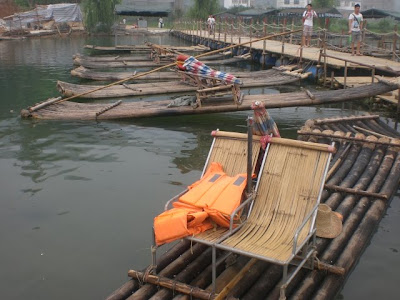Ni hao, all!
Sorry it's been so long since my first Yangshuo update! My internet access has been severely limited this past week. Anyway, here you go...with pictures!
Once we were FINALLY in Yangshuo, Amanda and I checked into our hostel and immediately went to Uncle Sam’s Travel Agency to figure out what we still had time left to do in our shortened weekend.
That afternoon we decided to take a bike to the Water/Mud Caves! I had forgotten to bring a swimsuit for the caves, so I had to buy one (which was very Chinese…it had a skirt attached over the bikini bottoms). We had a quick lunch at McDonald’s, which was the best view from any McDonald’s I’d ever been to, and were on our way!

Our tour guide, a local woman, surprised us by telling us that the bike ride would be an hour and a half to the caves. Amanda and I balked, but we accepted it and got on our (very cute pink) bikes.

We rode through the small city IN TRAFFIC before finally reaching the rural freeway. The views were spectacular, and we stopped at many points along our journey to take photos.

We veered off the main road and onto a rocky, bumpy local road, where we ran into many locals. They all wanted money to take pictures with them, including a pair of old women, a mother carrying her fat daughter in a basket on her back, and a man riding his water buffalo. They also all sold little souvenirs, but we didn’t buy any from them. It was still really fun interacting with the locals, though, and for the first time I felt like I was seeing the “real” China.

The scenery itself was absolutely breathtaking. We saw scores of rice fields at the base of the beautiful mountains. The first day was really sunny and perfect for our bike ride, but the following day was really cloudy and made the mountains look very mysterious. I said this in my previous post, but I felt like I was seeing an ancient Chinese calligraphy painting!

We took a minibus the rest of the way up the mountain to reach the mud caves. However, the bus was not in good condition, and the road was extremely rocky and bumpy. I wasn’t too sure if that minibus was gonna make it, to be honest…


However, we miraculously made it up the mountain, where we found a small village at the base of the cave entrance. I thought it was really cool to see chickens roaming freely on the dirt path.

After checking in our personal items in a locker (unfortunately, I had to leave my camera, so no pictures), we set off for the caves in a small, flat boat. We had to duck our heads very low to fit into the narrow gap between the river and the rock ceiling.
Once we were inside, our tour guide took us through the caves, which were very beautiful. I was shocked that we were allowed to touch the stalactites and stalagmites, since human bacteria can harm them. But as I’ve come to find throughout my travels in China, natural conservation is sorely lacking, and the Chinese government does not make much of an effort to conserve its natural resources.
There are three pools in the caves that we got to bathe in. The first, the cool mountain spring, was a little too cold for us, so we skipped it and went straight for the mud baths. They were also very cold, but I managed to get waist-deep in the mud pool. One of the men that worked for the picture booth in the cave kept asking me to get all the way in (so I’d look all muddy for the photo), but I adamantly refused and told him it was too cold (not to mention gross!).
At last we got to the hot spring, which was a completely natural mountain spring. We were able to wash off the mud while hanging out in the steaming spring water, but we were limited to a half hour. It was enough time, since hot springs and Jacuzzis tend to make me a little lightheaded after a while.
We left the caves and took the minibus back down the rocky mountain road. We bid farewell to our new Mexican friend, Ivan, who we’d met in the caves and found out was staying in the same hostel as us. We decided to meet for dinner later, and Amanda and I rode our bikes back to town. However, we asked if we could just take the freeway back and avoid the rural, rocky road, since we were tired and didn’t think we could manage it.
Unfortunately, that was all we had time to do that day, since night was already settling in by the time we got back. We decided to look around the shops in town, where vendors sold souvenirs and handicrafts. This part of town was obviously very tourist-oriented, because souvenir shops, bars, and restaurants were everywhere, but it didn’t seem too “fake,” if you catch my meaning. It still was tourist-oriented while maintaining its authentic and local atmosphere.

We had dinner at a delicious Chinese restaurant (which served Mandarin food, not nasty Cantonese) with Ivan, and after dinner we headed back through town to our hostel. They went up to the roof to play some Pool while I went to a shop for a cheap (USD $3) manicure. I was surprised that they were still open at 11:00 at night, but it seemed like Yangshuo came alive at night, since the streets were crowded with shoppers and tourists.

When I got back to the hostel, I joined Amanda on the roof to see the beautiful view of the Yangshuo rooftops at night (sorry for my crappy camera).

The next day we returned to the rooftop for breakfast, where I got to see the same view in the early morning. It was a bit cloudy that day, and the mountains looked so beautiful and mysterious, since the fog was obscuring the view a bit. I decided then that it was worth all the trouble to get here to see this view.

Today we had bamboo rafting on our itinerary. A taxi driver picked us up and took us to the starting point, and she would be waiting to pick us up at the drop-off point. I loved having Uncle Sam to plan our excursions and transportation for us! He was very affordable (especially for student backpackers) and very knowledgeable.

Our bamboo raft driver didn’t speak any English, but he kept pointing to things and explaining them to us in Mandarin Chinese. We just nodded and said “Wow! Cool! Okay-la!”
(*Note: In Asia, people add the sounds “la,” “ar,” and “a” after words like “yeah,” “no,” and “okay.” No reason, it just sounds cute.)

It was a very interesting experience. I was excited when I first saw the river, because it looked so clear! But at the beginning of our trip was a large tractor digging in the river and stirring up all the dirt and rocks and the bottom. The rest of the trip we only had a view of muddy, murky, brown river water. When we went over small waterfalls, the mud splashed up on us, and I got mud splotches on my jeans. I also couldn’t believe it when I saw locals washing their clothes in the river! Like I said, it was very interesting because I got to see how the locals lived, and I guessed they’d been doing things the same way for hundreds of years.

The river also had an outstanding amount of trash floating around. At one point I thought I could probably count close to one-hundred water bottles just in my line of vision. It was very sad, since I’m sure it was the fault of the high tourist traffic to Yangshuo. I was disappointed both in the tourists and the local government for not having any cleaning maintenance efforts. But like I said before, conservation of nature isn’t a priority in China.
We also got to see the fishermen’s birds nesting on their own bamboo raft under a bridge. Yangshuo is famous for its bird fishing, which refers to a mutually-beneficial relationship between humans and birds for hundreds of years. In the evening, the fishermen go out on their bamboo rafts, and the birds perch on the front. The birds go after the fish in the river, snatch them up, and drop them off on the boat. They leave them for the fisherman! The humans get their fish for dinner, and the birds get a free ride (and probably a tasty treat as well). We wanted to watch the bird fishing, but unfortunately our shortened weekend left us no time.

Once our bamboo raft ride was over, we went back to our hostel and checked out before heading to lunch and then to the bus station to get back to Guilin. At last our flight back to Guangzhou went without a hitch, but unfortunately we had missed the last bus to Zhuhai and ended up having to stay ANOTHER night in Guangzhou, which made us catch Monday morning rush hour at the Border Gate. Rather than returning on Sunday night like we were supposed to, we didn’t get home until noon the next day.
We decided that there was bad luck in Guangzhou.
Despite all of our “transportation issues,” the trip to Yangshuo was still definitely worth it. It was one of the most beautiful places I’d ever been in my whole life, and for the first time I’d felt like I’d gotten to see the real China. It was as if I’d traveled back in time to a much simpler age, rather than the hustle and bustle of today’s crowded, noisy cities. I’d definitely recommend a trip to Yangshuo to anyone traveling in China. This is a must-see place! I just wish we could have had a little more time, but it was also the perfect weekend excursion.
Unfortunately, this was the last of my trips in Asia. But then again, at that point I was a little sick of all the issues that going into mainland China caused me. And yet, the realization that I only had a week left in Macau left me a little sad, but I felt that I’d gotten to see all the places I really wanted to go.
I’m sure I will come back to Asia again someday, so it’s not goodbye forever!
Talk to you later!
Kati











































